 Sérgio P. Ávila
Sérgio P. Ávila
CIBIO, Centro de Investigação em Biodiversidade e Recursos Genéticos
InBIO Laboratório Associado
Pólo dos Açores
Departamento de Biologia da Universidade dos Açores
Campus de Ponta Delgada
Apartado 1422, 9501-801 Ponta Delgada
Açores, Portugal; and
MPB-Marine PalaeoBiogeography group
University of the Azores
Ponta Delgada, Portugal; and
Faculdade de Ciências da Universidade do Porto
Rua do Campo Alegre s/n,
4169-007 Porto
Portugal
avila@uac.pt
Sérgio P. Ávila is the head of the Marine PalaeoBiogeography research group at the University of the Azores. He is also in charge of the recent and fossil collection of marine invertebrates at the Department of Biology, University of the Azores. He received his M.Sc. and Ph.D. from the University of the Azores, where he completed two postdoctoral research fellowships. Sérgio is now a Research Associate of CIBIO-Açores and a marine (palaeo)biogeographer with a strong expertise in the taxonomy, ecology and biogeography of the NE Atlantic littoral marine molluscs. His main lines of research deal with the evolutionary patterns and processes of marine life in the shallow habitats of volcanic oceanic islands. To understand how dispersal, colonization and the subsequent speciation has happened in such places, Sérgio uses an holistic approach based on multidisciplinary studies performed in volcanic archipelagos (e.g., Azores, Madeira, Selvagens and Canaries), with a focus on the fossil record of Santa Maria Island (Azores). He is the leader of the yearly international workshops “Palaeontology in Atlantic Islands”, during which students and worldwide experts in volcanology, sedimentology, ichnology and biology (invertebrate taxonomy) join efforts in fieldwork at volcanic oceanic islands. He is currently working on the sustainable use and preservation of the rich palaeontological heritage of the Azores, with several projects that join Science with outreach activities (e.g., the Museum “Casa dos Fósseis”). He also keeps strong connections to the media (e.g., by producing TV programs) and to local tourism businessmen (e.g., by producing the scientific contents of the “Route of the Fossils” and especially by designing a marine tour, unique in the Atlantic Ocean, where outcrops and their fossils are visited during a tour by boat around the island of Santa Maria).

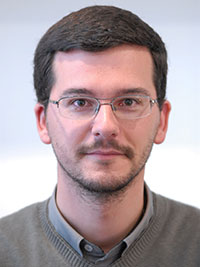 Ricardo Cordeiro
Ricardo Cordeiro
CIBIO, Centro de Investigação em Biodiversidade e Recursos Genéticos
InBIO Laboratório Associado
Pólo dos Açores
Departamento de Biologia da Universidade dos Açores
Campus de Ponta Delgada, Apartado 1422
9501-801 Ponta Delgada, Açores
Portugal; and MPB-Marine PalaeoBiogeography group
University of the Azores
Ponta Delgada
Portugal
rjpcordeiro@gmail.com
Ricardo Cordeiro is a marine biologist and Ph.D. student at the University of the Azores. His main research interest is related with the taxonomy, biodiversity, and biogeography of the marine gastropods present in the Azores. He is also involved in the study of the Neogene fossils of Santa Maria Island (Azores).

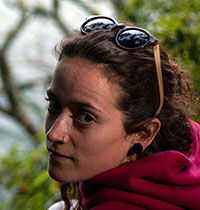 Ana R. Rodrigues
Ana R. Rodrigues
Departamento de Biologia da Universidade dos Açores
Campus de Ponta Delgada
Apartado 1422, 9501-801 Ponta Delgada
Açores
Portugal
arprodrigues.17@gmail.com
Ana Rita Rodrigues is a B.Sc. student in Biology (minor in Marine Biology) at the University of the Azores. She is currently working on the Pleistocene fossil record of Santa Maria Island.

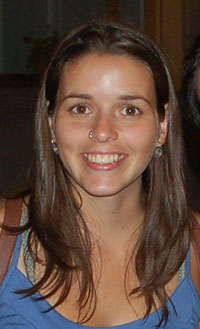 Ana C. Rebelo
Ana C. Rebelo
CIBIO, Centro de Investigação em Biodiversidade e Recursos Genéticos
InBIO Laboratório Associado
Pólo dos Açores, Departamento de Biologia da Universidade dos Açores
Campus de Ponta Delgada, Apartado 1422
9501-801 Ponta Delgada
Açores, Portugal; and MPB-Marine PalaeoBiogeography group
University of the Azores, Ponta Delgada
Portugal; and SMNS - Staatliches Museum für Naturkunde Stuttgart
Rosenstein 1, D-70191 Stuttgart
Germany
acfurtadorebelo@gmail.com
Ana Cristina Rebelo has a degree in Biology (2008) by the University of Azores and a Masters degree in Geology (2010) by the University of Lisbon. She is currently doing a Ph.D. at CIBIO-InBIO/Azores, at the University of the Azores, entitled "Miocene Rhodoliths of the Atlantic Archipelagos (Azores, Madeira, Canaries and Cape Verde): Systematics, Palaeoecology and Palaeobiogeography", under the supervision of Sérgio P. Ávila. The PhD is being done in cooperation with the Natural History Museum in Stuttgart (Germany), under the supervision of Michael W. Rasser.

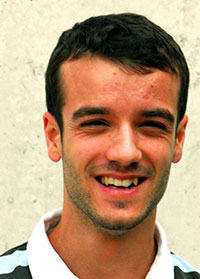 Carlos Melo
Carlos Melo
MPB-Marine PalaeoBiogeography group
University of the Azores
Ponta Delgada, Portugal; and Departamento de Geociências da Universidade dos Açores
Campus de Ponta Delgada
9501-801 Ponta Delgada
Açores
Portugal
casm.azores@gmail.com
Carlos Melo is a Biologist (minor in Geology) by the University of the Azores. He is currently a M.Sc. student at the Department of Geosciences of the University of the Azores. His main research interests are related to the geomorphological evolution of oceanic volcanic islands (coastal sediment transport and geomorphologic evolution of gravel islands) by the use of both geospatial and land survey data. Since 2009 he makes part of the Marine PalaeoBiogeography Working Group (MPB) were he has been developing and assisting several works regarding the Neogene fossil record of Santa Maria Island and the geological evolution of this island.

 Patricia Madeira
Patricia Madeira
CIBIO, Centro de Investigação em Biodiversidade e Recursos Genéticos
InBIO Laboratório Associado
Pólo dos Açores
Departamento de Biologia da Universidade dos Açores
Campus de Ponta Delgada
Apartado 1422
9501-801 Ponta Delgada
Açores
Portugal; and MPB-Marine PalaeoBiogeography group
University of the Azores
Ponta Delgada
Portugal
tamissa@hotmail.com
Patricia Madeira natural from Lisbon, moved to São Miguel Island (Azores) to study Biology at the University of the Azores. After graduation she joined the newly form MPB group (Marine Marine PalaeoBiogeography Research Group at the University of the Azores) where she started exploring the relatively unknown echinoid fauna from the fossiliferous outcrops of Santa Maria Island. Her Ph.D. project aims to study both extant and fossil echinoderm fauna in order to understand the processes and patterns that shape the present-day marine fauna in remote oceanic islands such as the Azores. Over the years, she was also involved in educational activities addressing questions such as "Why is the ocean blue?" to what is beyond our green planet.

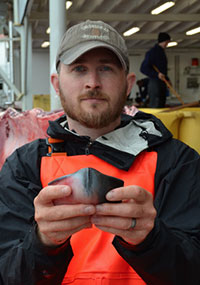 Nicholas D. Pyenson
Nicholas D. Pyenson
Department of Paleobiology
National Museum of Natural History
Smithsonian Institution, NHB, MRC 121
PO Box 3701
10th & Constitution N
Washington, DC 20013-7012
USA
PyensonN@si.edu
Nick Pyenson is the curator of fossil marine mammals at the Smithsonian Institution's National Museum of Natural History, in Washington, D.C. He received his Ph.D. from the University of California, Berkeley, and completed a postdoctoral research fellowship at the University of British Columbia. Nick is a vertebrate paleontologist whose research focuses on major land-to-sea ecological transitions in the past 250 million years. In this span of geologic time, many different lineages of reptiles and mammals -- whales, sea cows, mosasaurs, and turtles, for example -- have independently entered the oceans, showing both common patterns and unique solutions to the challenges of living the life aquatic. To understand how and why these ecological transitions have happened, Nick has studied many different aspects of marine vertebrates, including their taphonomy, biomechanics and paleobiology. Nick also leads active paleontological field programs on Vancouver Island in Canada, and with South American collaborators in the Atacama Desert of Chile. Nick is especially interested in growing public appreciation for natural patrimony and fossil resources, especially using digital tools that can expand fieldwork, outreach and natural history collections at the same time.


